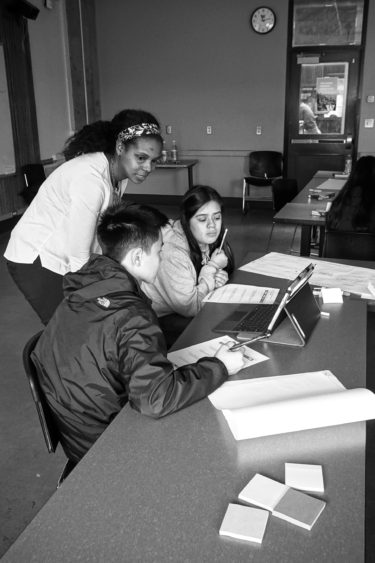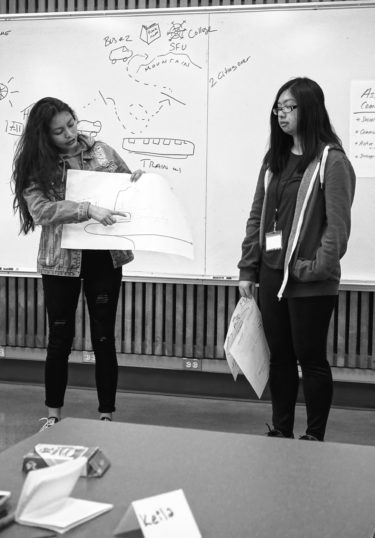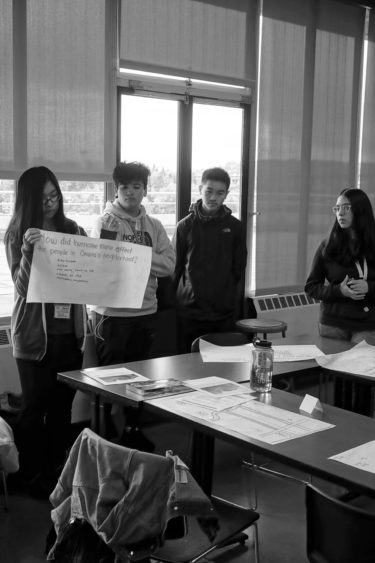Building a relationship with the Rainier Scholars to develop future community leaders and agents of change

Seattle’s Rainier Scholars program cultivates the academic potential of low-income students of color by providing access to postsecondary institutions, opening doors to future careers, and developing leadership skills. Students of color account for 66% of the students in Seattle Public Schools, and only 10% of those students are represented in the district’s advanced learning programs. These are the inequities that the Rainier Scholars program seeks to address. In collaboration with the University of Washington Department of Urban Design and Planning (UDP), they are determined to steward a relationship to create a meaningful connection with the University of Washington. Susie Wu, the Director of Leadership Development for Rainier Scholars, spoke warmly about the relationship built between UDP and the Rainier Scholars. “My hope is that our scholars become leaders of change at all levels of society. That’s what it will take to transform our society and build a pipeline.”
The students participating in the Rainier Scholars program are generally first-generation college students, negotiating an unfamiliar space without the experience from a member of their family. This is where relationships with institutions like the University of Washington are so instrumental. The access and contact with current students and professors demystify the college experience and place them at the same table with undergraduate, graduate, and PhD students. The results of this program are undeniable. The Rainier Scholars program has successfully mentored six cohorts from elementary school through college, with years of inspired young scholars to follow. There is tremendous power in seeing six years of students graduate ahead of you, building a landmark for success.

Leadership is a cornerstone of the department, exhibited by the dedication and passion of both students and faculty. Following a successful workshop in December which focused on gentrification and displacement in the Central District of Seattle, undergraduate and graduate students came together to host a second workshop focusing on public space and healthy communities. The built environment directly impacts the health of a community in lasting ways, and by understanding how planning decisions shape the distribution of resources, we can begin to heal the scars of spatial segregation. Urban design, architecture, and public health are powerful avenues for social change. This workshop helped Rainier Scholars understand the impact of these three disciplines and was aimed to inform their academic interests.

UDP students led the visiting scholars through exercises introducing fundamental concepts in these fields. The first was a mapping exercise that introduced students to the methodologies of Kevin Lynch. By exploring the relationships between nodes, edges, paths, districts, and landmarks, the students were taught the vernacular to experientially communicate space so that their neighborhoods may become more legible. In illustrating the relationships between certain types of spaces, a city can be broken down into its multiple components to become more navigable. The second exercise covered asset mapping through a discussion about how space is built, and who gets to build it. Through a mental map exercise, the scholars drew places they travel, places they love, and places they feel unwelcome. CEP student Maisha Barnett emphasized “if you want to make a change in your neighborhood, YOU are the community asset.” The last exercise illuminated the connection between public health and the built environment. By decoding the language surrounding public health and the built environment, the visiting scholars unpacked the relationship between gentrification, affordability, and life expectancy. Using census tract data, the scholars found that in some cities in King County have a 17-year difference in life expectancy. Concurrent MUP/MPH student Elise Rasmussen reinforced that “where you live influences
your health” and health inequities stem from disparities in education and income.
This is what access looks like. The bridges built during these workshops will help influence a future generation of leaders in our community who are invested in change. Students in the Department of Urban Design and Planning have created a bond with the Rainier Scholars. They have actively used their skills to develop a connection through academia to empower and educate. Having students of color lead these workshops is incredibly powerful in developing the way that the visiting scholars envision their academic and professional futures. MUP student Louie Leiva spoke about the importance of urban planning, stating that “we want to shape decisions and create better living environments for our families and communities.” When we plan for a city, we plan for our home, we plan for everyone.
To learn more about the Rainier Scholars program please visit rainierscholars.org.